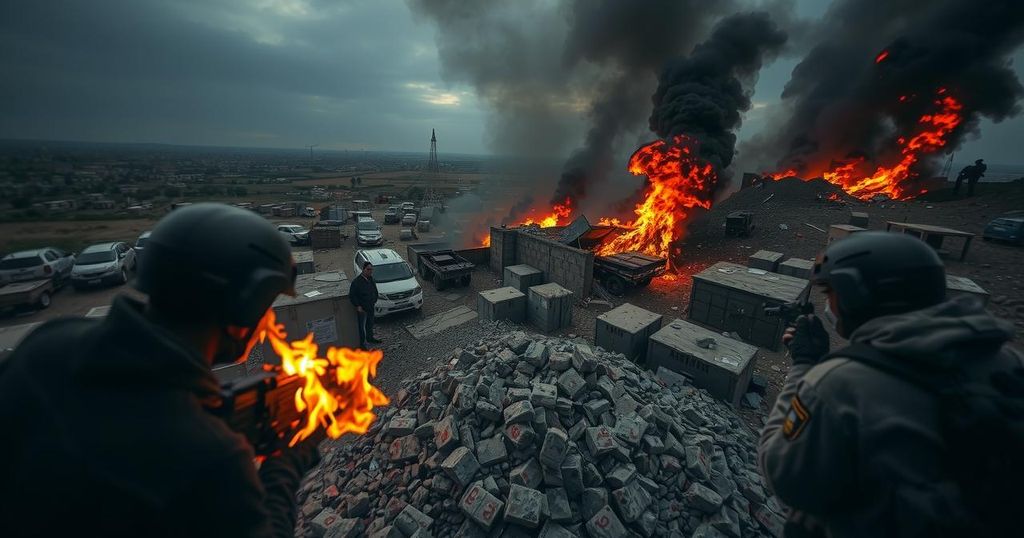Israel’s Legislative Moves Threaten UNRWA and Palestinian Refugee Status

Israel has approved new laws that may terminate the operations of UNRWA, severely impacting the humanitarian aid and essential services that the agency provides to millions of Palestinian refugees. As concerns mount regarding the implications of these laws on Palestinian status and humanitarian needs, UNRWA officials warn of catastrophic consequences that could ensue, including the erosion of rights, education, and health care for refugees, particularly in Gaza.
In the context of heightened tensions in the Middle East, the United Nations Relief and Works Agency for Palestine Refugees in the Near East (UNRWA) is facing an ominous fate as Israel moves to enforce new laws that may effectively terminate its operations. UNRWA has been instrumental in providing essential services, including education, health care, and humanitarian aid, to Palestinian refugees across the region. With the impending laws barring its existence, Palestinians fear that the cessation of UNRWA’s services will strip them of their refugee status and significantly worsen the humanitarian crisis in Gaza, already exacerbated by ongoing violence and blockades.
Israel’s legislative actions, which garnered overwhelming support in the Knesset, will not only halt UNRWA’s operations but will also eliminate a crucial safety net for millions of Palestinians. The agency’s commissioner-general, Philippe Lazzarini, has expressed his alarm over the potential humanitarian catastrophe that may unfold if UNRWA is dismantled and has urged other nations to involve themselves in pressing Israel to reconsider. He articulated that the eradication of UNRWA’s assistance, particularly in Gaza, would ensure that an entire generation is denied education and essential services, fostering conditions ripe for radicalization.
This grave scenario emerges from a historical backdrop where UNRWA was established in the wake of the 1948 Nakba, providing a lifeline to those displaced from their homes. Throughout the years, the agency has faced scrutiny from Israeli officials who allege that it has ties to militant groups. Concurrently, humanitarian organizations warn that without UNRWA, humanitarian crises will proliferate not only in Gaza but also across the West Bank and other areas where Palestinians seek refuge.
Despite Israel’s claims of militant infiltration in the agency, Lazzarini defended the integrity of UNRWA and stated that as a UN body, it operates under international laws. The ongoing military conflict has compounded these tensions, as accusations against UNRWA staff only serve to intensify scrutiny and limit funding, with many Western nations temporarily suspending their financial support pending investigations.
The implications of Israel’s legislative decision can lead to unimaginable consequences in Gaza, which is already grappling with severe shortages of food, clean water, and medical supplies. Lazzarini warned that this vote would result in “collective punishment” for the Palestinian population, struggling under continuous military operations and essential service failures. Organizations such as Amnesty International have condemned Israel’s actions, branding them as blatant violations of human rights and international law.
As the international community watches closely, the future of UNRWA remains uncertain. Should the agency be dismantled, experts argue that it would not only obliterate the services Palestinians depend on but also essentially disengage their refugee status from international scrutiny. Lazzarini has emphasized that, without a viable substitute to UNRWA, the humanitarian system in place will collapse, aggravating an already dire situation. The potential transformation in the status of millions of Palestinian refugees hinges critically on the unfolding political and humanitarian landscape in the weeks to come.
The United Nations Relief and Works Agency for Palestine Refugees in the Near East (UNRWA) was established following the 1948 Nakba, where approximately 700,000 Palestinians were expelled from their homes, creating a long-standing refugee crisis. UNRWA has since provided a broad scope of services, including health care and education, to refugees in Gaza, the West Bank, Jordan, Lebanon, and Syria. The agency operates under the expectation of eventually facilitating the return of Palestinian refugees to their homeland. However, in light of new Israeli legislation, UNRWA’s operations are now jeopardized, raising severe concerns about the future of Palestinian refugee status and humanitarian support. Israel’s position, claiming that UNRWA is linked to militant factions such as Hamas, drives a wedge between the agency and its funding sources, compounding the crisis.
The proposed Israeli laws against UNRWA portend dire repercussions for Palestinian refugees and the region’s broader humanitarian landscape. By banning the agency’s operations, Israel risks destabilizing the already precarious humanitarian situation, depriving millions of essential services while also diminishing the international legal recognition of Palestinian refugee status. The urgent calls from humanitarian leaders to halt these actions reflect a widespread apprehension that without UNRWA, the suffering of the Palestinian population will intensify, leading to greater instability in an already volatile region.
Original Source: www.arabnews.com








